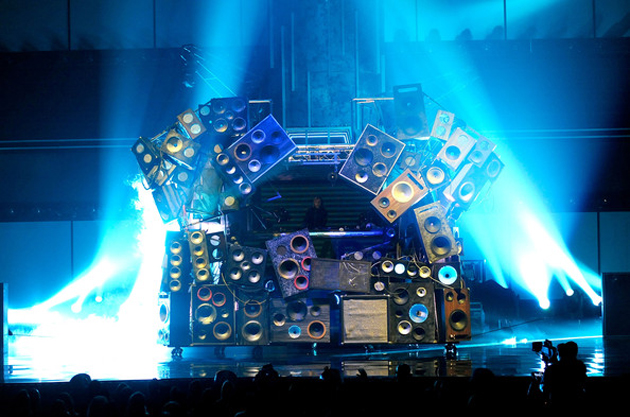 Larger festival presence and greater music sales form just one part of EDM’s mainstream ascent. Whether you argue this visibility has watered down the genre or is more beneficial is a moot issue. Instead of being seen as a more repetitive, if not lesser, form of disco, electronic dance music has stepped up from being a “club” genre and is being recognized as such. But, considering its existence, particularly as a regularly-heard genre in Europe, the recent inclusion at U.S. music award ceremonies has the air of a participation trophy all over it and is a somewhat belated, if not misinformed, occurrence.
Larger festival presence and greater music sales form just one part of EDM’s mainstream ascent. Whether you argue this visibility has watered down the genre or is more beneficial is a moot issue. Instead of being seen as a more repetitive, if not lesser, form of disco, electronic dance music has stepped up from being a “club” genre and is being recognized as such. But, considering its existence, particularly as a regularly-heard genre in Europe, the recent inclusion at U.S. music award ceremonies has the air of a participation trophy all over it and is a somewhat belated, if not misinformed, occurrence.
The recent American Music Awards ceremony was the latest to do so. With nominees based on sales and involving online voting for the sixth year, the AMAs honored David Guetta, Calvin Harris, and Skrillex as its first nominees in the Electronic Dance Music category. While Guetta won, none of the producers were present to pick up a potential award.
Over the summer, MTV made a similar announcement about the VMAs. For the first time, an Electronic Dance Music Video category was added, with nominees including Avicii, Duck Sauce, Martin Solveig, Calvin Harris, and Skrillex. In a too-safe move, Harris won for “Feel So Close.”
Although inclusion at the AMAs and VMAs is another move, of many that occurred in 2012, in a mainstream direction, electronic music has had its own award ceremonies for years. Case in point is the International Dance Music Awards, in its 27th year in 2012, that offers a greater and more thorough cross section of the genre. Categories span types of remixes (hip-hop, indie, and alternative, for instance), subgenres and sub-subgenres, and gear, and even DJs are recognized separately for original production and remixing skills. Higher-profile artists are acknowledged just as much as up-and-comers and niche performers.

But beyond the artists nominated, presentation between genre-specific awards and the AMAs vary, and this aspect, in a sense, has a condescending yet oblivious tone to it. Award presenters Elisha Cuthbert and Kelly Rowland addressed the crowd with dialog better fit for an early 1990s lambada movie than a genre experiencing its highest U.S. peak so far:
Cuthbert: EDM! It’s the hottest new thing in music! If you’re wondering what EDM stands for, it means electronic dance music.
Rowland: Now this is a brand new category recognizing this increasingly important genre of music.
Acknowledging EDM outside the confines of the genre without infantilizing it is not impossible. The Grammys, while their nominations are slightly misguided, have included electronic dance music categories since 1998. Although a Best Disco Recording appeared in 1980, with the award going to Gloria Gaynor and producer Dino Fekaris for “I Will Survive,” the genre didn’t start having a consistent category until the late 1990s, when Best Dance Recording was added. That year, Donna Summer and Giorgio Moroder took the award for “Carry On.” However, likely because the National Academy of Recording Arts and Sciences considered dance “something pop artists had created in their most frivolous moments,” electronic music was seen as a pop category at the award ceremony until 2003.
Then, in 2005, Best Dance/Electronica Album, with the award going to Basement Jaxx, was introduced. Although Grammy nominations have been extremely questionable in the past (Baha Men for “Who Let The Dogs Out” over Moby in 2001 and Cher’s “Believe” over Fatboy Slim the previous year, for instance), selections have started improving since the genre’s greater visibility.
Even with this lengthier history, at least regarding mainstream music ceremonies, the Grammys didn’t actually acknowledge EDM until this year. For 2012, performers were incorporated into the show, with nominees Deadmau5, the Foo Fighters, Chris Brown, Guetta, and Lil Wayne performing in a tent surrounding the audience. Producer Ken Ehrlich called it, “
Mainstream acceptance, as we’ve mentioned before, is a precipitous walk, with obscurity on one side and changing your sound to suit record sales and award ceremonies on the other. The increased presence at the VMAs, AMAs, and Grammys, while a sturdy and clear acknowledgement toward acceptance, is simply a positive gesture from the rest of the music world – but not one bound to revolutionize electronic music any time soon.



